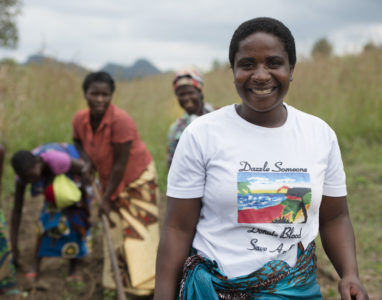 Anniversaries mark moments in time to take stock of accomplishments and reflect on the path traveled. But they also inspire us to look forward to see what has yet to be done, the other places we need to go.
Anniversaries mark moments in time to take stock of accomplishments and reflect on the path traveled. But they also inspire us to look forward to see what has yet to be done, the other places we need to go.
In honor of its 50th anniversary, the International Potato Center (CIP) held an online celebration focused on its efforts in Africa where it has used potatoes and sweetpotatoes to inspire innovations for improved nutrition, food systems, and inclusive growth for millions of smallholder farmers.
“We have enjoyed working with CIP because they deliver in times of crisis and they help us meet our goals,” said Ruairi De Burca, the Director General of Irish Aid, which has supported CIP’s work in Malawi and several other African nations. “We will continue to focus on hunger and nutrition and fostering sustainable development… and the externalities that flow from CIP will help us meet our future commitments.”
The “future commitments” from Irish Aid and many funders and aid agencies around the world will come into sharper focus later this year at the United Nations’ Food Systems Summit, the UN Climate Change Conference (CoP 26), and the annual Conference on Nutrition 4 Growth.
During the event, these commitments (and the challenges they present) were the focus of four-person discussion regarding CIP’s work in Malawi with partners and 11 other CGIAR centers, which offers many excellent approaches into successful potato and sweetpotato programs while providing an excellent window through which to view the potential for transforming the food systems over the next 50 years.
And the time for transforming food systems could not be more urgent in Africa: the continent’s population is expected to reach 2.5 billion by 2050. The need to produce more food without degrading vital natural resources is escalating rapidly. More than ever, scientific innovations and partnerships can help ensure there is enough nutritious food and income opportunities for all Africans, especially young people.
“Innovations from CIP have taken many forms in Malawi,” said Wilkson Makumba, the country’s Director for the Department of Agricultural Research Services. “Since 2007, we have helped launch 10 potato varieties and 13 sweetpotato varieties, and we have improved seed systems with aeroponics, micropropagation, and the quality requirements for seed sales. These advances have improved nutrition and income significantly in our country.”
For Regina Kapinga, the Head of Advocacy and Resource Mobilization at the International Institute of Tropical Agriculture (IITA), these innovations for potato, sweetpotato and other root and tuber crops have never been more important than during the pandemic.
“We call them ‘COVID-19 shock absorbers.’ Because potato and sweetpotato can grow in difficult climates and became they require less labor than other crops, these foods helped save many families from crisis. In the future, after droughts and floods, these will be the first crops to provide food and nutrition. Also, during the pandemic, potato and sweetpotato were not affected by international price fluctuations, unlike like maize and rice.”
The relative low labor requirement for potato and sweetpotato also present prime opportunities for women and youth to participate in the market and invest more strongly in agriculture, according to Jean Pankuku, the Chair of the Root and Tuber Development Trust in Malawi and herself an entrepreneur with a business that uses processed sweetpotato puree for baked goods. However, she adds, more focus is needed on value chains so that small innovations can be scaled up to create stronger markets for farmers.
This last point was echoed by Jane Ininda, the Head of Seed Research and Systems Development with the Alliance for a Green Revolution in Africa. She said farmers need to know there will be buyers for potato and sweetpotato before they can be convinced to dedicate more resources to those crops. “On the other hand,” Ininda said, “We also need better knowledge of what consumers want and we need to tell them more about the nutritional advantages of these crops.”
All these examples from Malawi, said Paul Demo, CIP’s Regional Director for Africa, reflect the power of models and partnership to strengthen national institutions and value chain actors. “Our relationship with Malawi was relatively young compared to other African countries. But we saw what was working in other places and brought it here with the appropriate context. Then we focused on building the capacity of scientists and breeders to ensure these models can sustain themselves in the future.”
As an example, Demo cited the Malawi Crop Root and Tuber Development Trust, which began as an informal group of farmers and food processors and today is a formal organization working with the private sector to create inroads for more potato and sweetpotato products.
In closing the session, CIP’s Director General (and recently-appointed CGIAR Global Director for Genetic Innovation), Barbara Wells, expressed excitement at the potential for potato and sweetpotato to play a major role in the food systems transformation so urgently needed to meet the 2030 Sustainable Development Goals. “It is not exaggeration to say that gains in Africa for agri-food systems are key to improved food and nutrition security around the world… the innovations and partnerships described here today will continue to be the lifeblood of our work in the One CGIAR.”.
